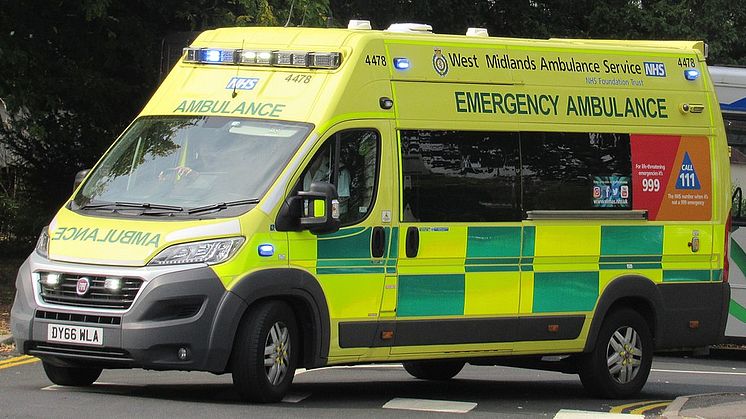
Press release -
Tens of thousands of emergency patients waited nearly an hour and a half for ambulances
More than 38,000 people who called 999 in January 2022 waited at least nearly one and a half hours for an ambulance with an emergency condition such as stroke, today’s (10.02.22) figures show.
Today’s data release from NHS England shows that the 10% of category 2 (90th centile corresponding to 38,299 incidents) calls to 999 (which include strokes) took over 1 hour and 23 minutes(01:23:35) to arrive in January 2022. The average response time is 38 minutes (00:38:04), over twice the 18 minute response time target.
In the UK, over 100,000 people have a stroke per year and 1.3 million stroke survivors. Most recent data shows that stroke, a sudden brain attack, is fatal for one in eight (13.2%) patients. This is because for every minute a stroke goes untreated, 1.9 million brain cells die. The extra time taken for an ambulance to arrive increases the probability of death or unnecessarily severe disability as a consequence of stroke. The Stroke Association expects stroke mortality to increase this winter with delays in treatment and a possible increase in stroke patients co-presenting with Covid-19; both of which significantly affect chances of patient morbidity.
Around 87% of strokes are caused by a blood clot in the brain. The most widely used treatment, thrombolysis - ‘clot-busting’ drugs - can only be administered within four and a half hours of stroke symptoms starting and get less effective as time goes on. Other treatments, such as mechanical thrombectomy rely on access within a similarly narrow timescale from onset of symptoms.
Juliet Bouverie OBE, Chief Executive of the Stroke Association, said: “I am seriously concerned that this crisis situation for the ambulance service could have life-threatening consequences for stroke patients. We know that time lost is brain lost, because when you’re having a stroke, over 1.9 million brain cells die every minute. Although there has been an improvement this month, this data shows that ambulance delays are still are still worryingly long.
“Over the past few years, ambulance delays have slowly increased and the times taken for stroke patients to get appropriate treatments has crept up too. This has been an increasing danger for many years, but now we see an unprecedented leap in ambulance response times. I am worried that this severely threatens the lives and recoveries of stroke patients. Ambulance delays means delayed or missed chances for treatment, which cause avoidable disability and even death for some stroke patients.
“We recognise and applaud the hard work of ambulance call handlers, paramedics and stroke clinicians. They've made great progress in reducing time to emergency treatment when a stroke patient arrives at hospital. But these gains are being squandered by systemic challenges that mean ambulances are not getting patients to hospital in the window that allows for life-saving and life-changing treatment. We're also concerned that some patients are being advised to make their own way to hospital which is scary and often not appropriate.
“Long ambulance delays are a symptom of a system which is failing. This is a problem across the whole health and social care system, which fails to get people in, through and out of hospital.
“This cannot be solved overnight and won’t recover this winter.
“The best thing you can do to help you or a loved one have the best chance of survival and recovery from stroke is to raise the alarm as soon as possible. The FAST message is now more important than ever. Make sure everyone you know and love calls 999 as soon as they see any of the signs of stroke. Calling 999 quickly is still important because it lines up getting scanned and seen by a stroke specialist as soon as possible when you arrive at hospital.”
Category 2 | Response times | |||
Ambulance Service | Count of Incidents | Total (hours) | Mean (min:sec) | 90th centile (hour:min:sec) |
England | 382,994 | 242,978 | 38:04 | 01:23:35 |
East Midlands | 36,908 | 23,883 | 38:50 | 01:23:24 |
East of England | 41,556 | 31,969 | 46:09 | 01:40:17 |
Isle of Wight | 988 | 358 | 21:43 | 00:43:47 |
London | 56,824 | 33,068 | 34:55 | 01:17:42 |
North East | 19,518 | 10,202 | 31:22 | 01:06:35 |
North West | 46,149 | 33,543 | 43:37 | 01:41:35 |
South Central | 25,010 | 9,575 | 22:58 | 00:45:47 |
South East Coast | 32,766 | 15,479 | 28:21 | 00:56:54 |
South Western | 39,082 | 37,403 | 57:25 | 02:08:19 |
West Midlands | 47,465 | 27,472 | 34:44 | 01:16:10 |
Yorkshire | 36,718 | 20,026 | 32:43 | 01:13:03 |
Related links
Topics
Categories
- Stroke strikes every five minutes in the UK and it changes lives in an instant.
- The Stroke Association is a charity working across the UK to support people to rebuild their lives after stroke. We believe that everyone deserves to live the best life they can after stroke. From local support services and groups, to online information and support, anyone affected by stroke can visit stroke.org.uk or call our dedicated Stroke Helpline on 0303 3033 100 to find out about support available locally.
- Our specialist support, research and campaigning are only possible with the courage and determination of the stroke community and the generosity of our supporters. With more donations and support, we can help rebuild even more lives.
- You can follow us on Twitter, Facebook and Instagram.












